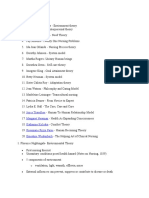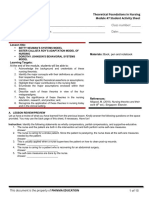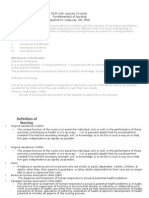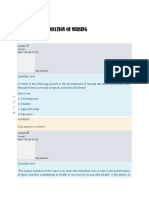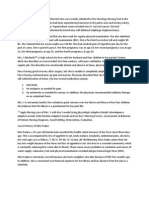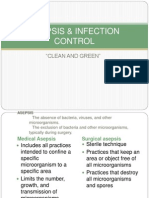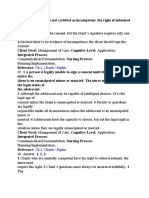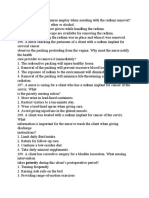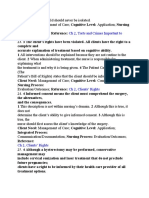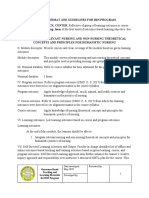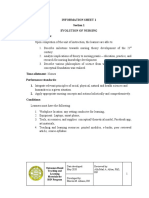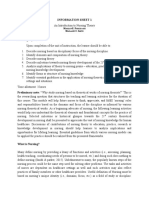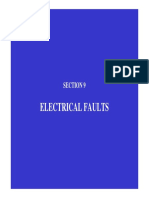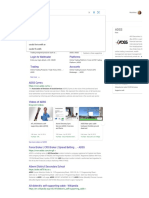TFN Module Revised Version
TFN Module Revised Version
Uploaded by
AMIR LADJACopyright:
Available Formats
TFN Module Revised Version
TFN Module Revised Version
Uploaded by
AMIR LADJAOriginal Title
Copyright
Available Formats
Share this document
Did you find this document useful?
Is this content inappropriate?
Copyright:
Available Formats
TFN Module Revised Version
TFN Module Revised Version
Uploaded by
AMIR LADJACopyright:
Available Formats
PROVIDING SAFE, QUALITY, AND HOLISTIC CARE TO INDIVIDUAL AND
FAMILY UTILIZING VARIOUS NURSING THEORETICAL WORKS
AND RELATED MODEL.
Module descriptor: This module covers relevant nursing and non-nursing theoretical concepts
and principles used in providing safe, quality, and holistic nursing care
grounded in caring science.
Nominal duration:
Program outcome:
1. Apply knowledge of physical, social, natural, and health sciences and humanities in
the practice of nursing;
2. Provide safe, appropriate and holistic care to individuals, families, population,
group and community utilizing nursing process;
3. Apply guidelines and principles of evidence – base practice in the delivery of care;
4. Practice nursing in accordance with existing laws, legal ethical and moral
principles;
5. Communicate effectively in speaking, writing and presenting using culturally –
appropriate language;
6. Document to include reporting up-to-date client care accurately and
comprehensively;
7. Work effectively in collaboration with inter-, intra-, and multi – disciplinary, multi
– cultural teams;
8. Practice beginning management and leadership skills in the delivery of client care;
9. Apply techno – intelligent care systems and processes in health care delivery;
10. Adopt the nursing core values in the practice of the profession;
Course outcome:
1. Apply knowledge of nursing theoretical concepts and principles for humanistic
practice of nursing;
2. Utilize nursing process to develop safe, appropriate, and holistic care plan to
individual person using various theoretical nursing frameworks or nursing models;
3. Apply guidelines and principles of evidence – based practice in nursing care of an
individual person.
4. Practice nursing in accordance with existing laws, legal ethical and moral
principles;
5. Communicate effectively in speaking, writing and presenting using culturally –
appropriate language in the practice of nursing.
6. Report and document up-to-date client care accurately and comprehensively;
Date developed: Reviewed by:
Outcomes-Based May 2020
Teaching and
Learning Materials
1
for BSN Program Developed by:
7. Collaborate effectively with inter-, intra-, and multi-disciplinary, multi-cultural
team;
8. Integrate knowledge of theoretical concepts and principles in the management of
nursing care of an individual person;
9. Relate the interrelationship among theory, practice, and research;
10. Apply techno-intelligent care systems and processes for humanistic practice of
nursing;
11. Uphold nursing core values in the practice of profession.
Learning outcomes:
1. Integrate relevant nursing and non-nursing theoretical concepts and principles for
humanistic practice of nursing.
2. Apply knowledge of theoretical concepts and principles in collaborating with other
member of the healthcare team in the delivery of safe, quality, holistic care to
individual client.
3. Apply various nursing theories in provision of nursing care.
4. Integrate evidence-based nursing care relevant to various nursing theoretical
frameworks.
5. Integrate nursing theoretical concepts of technology in the humanistic practice of
nursing.
6. Demonstrate caring as the core of nursing
7. Demonstrate therapeutic techniques of communication
8. Adhere to protocol and principles of confidentiality
9. Identify legal and ethical issues of patient-care based from group presentation.
Self-Directed Learning (SDL) Activities and Output:
The learner should perform and/or submit the following evidence of learning:
1. Structure your own inquiry approach or mechanism to expound learning. Document the
approach and provide brief description of the processes when asked to share self-study
tips.
2. Create something out of your learning experience (i.e., build own personal learning
syllabus, information sheet, algorithms/flowcharts, mnemonics, etc.) and be able to share
such output with other learners.
3. Build and maintain network of learning colleagues who pursue knowledge and value
progress over grades and performance.
4. Post response on questions developed by instructor at identified online learning platform.
Date developed: Reviewed by:
Outcomes-Based May 2020
Teaching and
Learning Materials
2
for BSN Program Developed by:
5. Post response on selected views/opinion of classmates on posed questions at identified
online learning platform.
6. Create short video to simulate theory-based provision of nursing care.
7. Articulate your personal definition of nursing and philosophies out of your learning
experience.
8. Share peer-reviewed article as basis for evidence-based practice of nursing.
Performance indicators:
1. Integrate relevant principles of social, physical, natural and health sciences and
humanities in a given health and nursing situation.
2. Apply appropriate nursing concepts and actions holistically and comprehensively
(add other performance indicators of applicable program outcomes – refer to CMO 15 s. 2017)
Conditions:
Learners must have the following:
1. Workplace location: simulate varied health care settings
2. Equipment: Personal laptop and/or smart phone with internet connectivity;
3. Tools/Apps, accessories, and supplies: Facebook app; school & art materials
4. Outcomes-based teaching and learning resources: module; e-books or peer reviewed
article; course-syllabus; rubrics; activity instructions & guidelines; videos;
(Update as needed to reflect needs based on OBTL strategies and required output of applicable
learning outcomes)
Assessment method:
1. Portfolio: written output (online/offline) and other evidences of learning.
2. Written test
3. Self-assessment study questions
4. Oral questioning or interview
5. Observation
Content
Learning outcomes Content
Integrate relevant nursing and non- Evolution of Nursing
nursing theoretical concepts and A. An Introduction to Nursing Theory
principles for humanistic practice of 1. Nursing Theory and the Discipline of Nursing
Date developed: Reviewed by:
Outcomes-Based May 2020
Teaching and
Learning Materials
3
for BSN Program Developed by:
nursing. 2. A guide for the study of Nursing Theories for
Practice
3. Choosing, Evaluating, and Implementing Nursing
Theories for Practice
B. Science and Philosophical schools of thought
1. Received view (empiricsm, positivism, logical
positivism)
2. Perceived view (Human science, phenomenology,
constructivism, Historicism)
3. Nursing philosophy, nursing science, and
philosophy of nursing science
C. Structure of the Nursing Knowledge
1. Structural level
2. Metaparadigm
. Person
. Health
. Environment
. Nursing
3. Philosophy
4. Conceptual Models
5. Theory
6. Middle-Range Theory
Apply knowledge of theoretical
concepts and principles in Nursing Theorist and their Works
collaboration with other member of the A. Nursing Philosophies
healthcare team in the delivery of safe 1. Nightingale’s Environmental Theory
and quality care of an individual 2. Watson’s Theory of Human Caring
person. 3. Benner Benner’s Stages of Nursing Expertise,
Nursing Philosophies
4. Eriksson’s Caritative Caring Theory
B. Nursing Conceptual Models
1.Roger’s Science of Unitary Human Beings
Nursing Conceptual Model
2. Orem’s Self-care Deficit Model
3. King’s General Systems Framework Nursing
Conceptual Model
4. Neuman’s Systems Model
Date developed: Reviewed by:
Outcomes-Based May 2020
Teaching and
Learning Materials
4
for BSN Program Developed by:
5. Roy’s Adaptation Model
6. Johnson’s Behavioral System Model
C. Nursing Theories
1. Peplau’s Theory of Interpersonal Relationships
2. Orlando’s Theory of Deliberative Nursing Process
3. Travelbee’s Human to Human Relationships
4. Hall’s CORE, CARE, CURE
5. Abdellah’s 21 Nursing Problems
6. Henderson’s Need Theory
7. Pender’s Health Promotion Model; Nursing
Theories
8. Leininger’s Theory of Culture Care Diversity and
Universality
9. Newman’s Theory of Health as Expanding
Consciousness
10. Parse’s Theory of Human Becoming
11. Watson’s Theory of Human Caring
12. Orlando’s Nursing Process
13. Locsin’s Technological Competency as Caring
Local Theories and Models of Nursing
Interventions (Philippine Setting)
1. Locsin’s Technological Nursing Care as Model
2. Agravante’s CASAGRA Transformative
Leadership Model
3. Divinagracia’s COMPOSURE Model
4. Kuan’s Retirement and Role Discontinuity Model
5. Abaquin’s PREPARE ME Holistic Nursing
Interventions
6. Laurente’s Theory of Nursing Practice and Career
7. Synchronicity in Human- Space- Time: A theory
of Nursing Engagement in a Global Community
Theories Relevant to Nursing Practice
1. Maslow’s Human Need Theory
2. Sullivan’s Transactional Analysis
3. Von Bertalanffy’s General Systems Model
4. Lewin’s Change Theory
5. Erikson’s Psychosocial Development
Date developed: Reviewed by:
Outcomes-Based May 2020
Teaching and
Learning Materials
5
for BSN Program Developed by:
6. Kohlberg’s Moral Development
Apply various nursing theories in Discuss nursing process.
provision of nursing care. 1. Overview of nursing process.
2. Group Presentation for the application of nursing
theories.
Integrate nursing theoretical concepts Nursing theories and healthcare technology.
of technology in the humanistic 1. Technological Competency as Caring in Nursing
practice of nursing. (TCCN) – (Locsin, 2005)
2. Transactive Relationship Theory of Nursing
(TreToN) – (Tanioka, 2017)
3. Humanistic Nursing’s Collaborative Caring
Model (HuNCC) – (Sahiron & Akbar, 2018)
Demonstrate caring as the core of Discuss ‘nursing as caring’
nursing 1. 6 C’s of caring
2. Boykin & Schoenhofer’s – Nursing as Caring
3. Jean Watson’s caring theory
Demonstrate therapeutic techniques of Discuss therapeutic techniques of communication
communication within Transcultural theory of nursing
Discuss APA guidelines in writing scholarly report
(written requirements for the course)
Adhere to protocol and principles of Provide an overview for reporting and documenting
confidentiality client care and discuss some ethical principles
Identify legal and ethical issues of Discuss overview of RA 9173, and Nursing ethics
patient-care based from group
presentation
Integrate evidence-based nursing care Overview of evidence-based practice in nursing
relevant to various nursing theoretical 1. Overview of EBP
frameworks. 2. Characteristics of EBP
3. Theory and EBP
Introduce ways how nursing theory can be used for
development of nursing knowledge to inform
Date developed: Reviewed by:
Outcomes-Based May 2020
Teaching and
Learning Materials
6
for BSN Program Developed by:
nursing practice and education.
Identify various nursing theoretical issues or agenda
for future topics of research study.
Date developed: Reviewed by:
Outcomes-Based May 2020
Teaching and
Learning Materials
7
for BSN Program Developed by:
INFORMATION SHEET 1.1
An Introduction to Nursing Theory
Learning objectives:
Upon completion of the unit of instruction, the learners are able to:
1. Describe milestone towards nursing theory development of the 21st century.
2. Describe nursing theory, elements, and various classification.
3. Analyze implications of theory to nursing praxis – education, practice, and
research for nursing knowledge development.
4. Identify essential guidelines in application of nursing theoretical works for
humanistic practice of nursing.
Time-allotment:
(Copy paste content from reliable references for time being only! If not available in MS word
format, print required references from e-book and attached to module)
References:
Smith, M.C. & Parker, M.E. (2015). Nursing theories & nursing practice (4th ed.). Philadelphia:
F.A. Davis Company
Expanded learning opportunities:
I. Advancing learning:
For advanced learner - identification of activities such as those done in graduate
education (for excellence graduate attribute criteria indicator and a curriculum
that prepare students for next level of education).
Additional readings and may include links to video on youtube pertaining to
course content – make sure you have checked the content for validity).
II. Provision of appropriate support to special group of learners:
Creation of academic support system among learning participants – peer-tutoring
or mentoring. Assign advanced learner to assist other students.
Referral to available academic support system and services.
Others – which will be specified once identified by the teacher along the process.
Date developed: Reviewed by:
Outcomes-Based May 2020
Teaching and
Learning Materials
8
for BSN Program Developed by:
Written test: develop at least 5-15 multiple choice questions or any other type of test. Self-
assessment questions should be specified under this section. Student will submit their answer as
private message to FB account or email of teacher or as a post in FB closed group page.
Answer key (provide answer key but keep it to yourself)
Date developed: Reviewed by:
Outcomes-Based May 2020
Teaching and
Learning Materials
9
for BSN Program Developed by:
INFORMATION SHEET 1.2
Science and Philosophical schools of thought
Learning objectives:
1. Describe various philosophies of science from which nursing theories’ conceptual
foundation were realized.
Date developed: Reviewed by:
Outcomes-Based May 2020
Teaching and
Learning Materials
10
for BSN Program Developed by:
INFORMATION SHEET 2.1
Nursing Theorist and their Works
Date developed: Reviewed by:
Outcomes-Based May 2020
Teaching and
Learning Materials
11
for BSN Program Developed by:
INFORMATION SHEET 2.2
Local Theories and Models of Nursing Interventions (Philippine Setting)
Date developed: Reviewed by:
Outcomes-Based May 2020
Teaching and
Learning Materials
12
for BSN Program Developed by:
INFORMATION SHEET 2.3
Theories Relevant to Nursing Practice
Date developed: Reviewed by:
Outcomes-Based May 2020
Teaching and
Learning Materials
13
for BSN Program Developed by:
INFORMATION SHEET 3
Nursing theories and healthcare technology
Date developed: Reviewed by:
Outcomes-Based May 2020
Teaching and
Learning Materials
14
for BSN Program Developed by:
INFORMATION SHEET 4
Nursing is caring
Date developed: Reviewed by:
Outcomes-Based May 2020
Teaching and
Learning Materials
15
for BSN Program Developed by:
INFORMATION SHEET 5
Therapeutic techniques of communication within Transcultural theory of nursing
Date developed: Reviewed by:
Outcomes-Based May 2020
Teaching and
Learning Materials
16
for BSN Program Developed by:
INFORMATION SHEET 6
Overview of RA 9173 and Nursing ethics
Date developed: Reviewed by:
Outcomes-Based May 2020
Teaching and
Learning Materials
17
for BSN Program Developed by:
INFORMATION SHEET 7
Overview for reporting and documenting client care and discuss some ethical principles
Date developed: Reviewed by:
Outcomes-Based May 2020
Teaching and
Learning Materials
18
for BSN Program Developed by:
INFORMATION SHEET 8
Overview of evidence-based practice in nursing
Date developed: Reviewed by:
Outcomes-Based May 2020
Teaching and
Learning Materials
19
for BSN Program Developed by:
APPENDIX
A. Rubrics
Rubrics: append all rubrics as part of the module so learners understand the bases for assessment
of learning (scoring/grading)
Rubrics on posting response on posed question/views
Note: when making rubrics, please fit criteria to elements based on performance
indicators.
Date developed: Reviewed by:
Outcomes-Based May 2020
Teaching and
Learning Materials
20
for BSN Program Developed by:
B. Schedule of OBTL output and assessment
Requirement Date due
Formative: _____
Personal introduction (for freshmen and new students or
advancing students under new faculty in-charge)
Instruction:
Answer written test:
Instruction for submission:
Posting response on questions related to course-readings: LO 1 -
Instruction: LO 2 –
LO 3 -
Participation: posting response on classmates’ opinion/view LO 1
Instruction: LO 2
LO 3
Peer-reviewed article
Instruction:
Simulation video on application of theory (terminal output)
Instruction:
Summative:
Premidterm exam To be scheduled
Midterm exam
Prefinal exam
Final exam
Date developed: Reviewed by:
Outcomes-Based May 2020
Teaching and
Learning Materials
21
for BSN Program Developed by:
*include instruction on offline submission for learners with no internet connectivity and specify
allowable days for delayed submission as appropriate.
Grading system:
Pre- Pre-
Sources of scores Mid Final Weight
mid final
1. Term examinations 50% 50% 50% 50%
2. OBTL output (quizzes, postings, etc.) 40% 40% 40% 40% 80%
3. Attendance/Participation/Decorum 10% 10% 10% 10%
4. Terminal requirement (application of
20% 20%
theory)
Final Grade 100%
Note: this sample includes interrelated program outcomes for sense of ‘wholeness’.
Date developed: Reviewed by:
Outcomes-Based May 2020
Teaching and
Learning Materials
22
for BSN Program Developed by:
You might also like
- TFN Concept AsnwesxrationalesDocument34 pagesTFN Concept Asnwesxrationalestflorenz67% (3)
- TFN Compilation of Sas 1 23Document56 pagesTFN Compilation of Sas 1 23Sabria RoseNo ratings yet
- Compilation of Theorist (METAPARADIGMS)Document4 pagesCompilation of Theorist (METAPARADIGMS)3amabelle arevaloNo ratings yet
- NCM 103Document18 pagesNCM 103Anonymous iG0DCOf100% (1)
- The Learning Process: NCM 102-HEALTH EDUCATION AY:2020-2021Document74 pagesThe Learning Process: NCM 102-HEALTH EDUCATION AY:2020-2021CLARENCE REMUDARONo ratings yet
- Morris Mano - Computer Architecture PPT Chapter 7Document26 pagesMorris Mano - Computer Architecture PPT Chapter 7Anmol Agrawal100% (2)
- TFN Handouts Midterm and Finals A4Document28 pagesTFN Handouts Midterm and Finals A4ZIAN LABADIANo ratings yet
- Tfn. Mdule.2Document51 pagesTfn. Mdule.2Kath JoseNo ratings yet
- TFN Module 4 Content - Nursing TheoriesDocument25 pagesTFN Module 4 Content - Nursing TheoriesCamilleCalmaLenonNo ratings yet
- TFN F.A. Module 1Document4 pagesTFN F.A. Module 1Yep YepNo ratings yet
- TFN Module 1Document10 pagesTFN Module 1Emil Nicholas Nicole DenzNo ratings yet
- NCM 100 - Theoritical Foundation of NursingDocument11 pagesNCM 100 - Theoritical Foundation of Nursingrum cueszhNo ratings yet
- Jade Cameron J. Diaz - Tfn-Final-ExamDocument8 pagesJade Cameron J. Diaz - Tfn-Final-ExamJadeNo ratings yet
- TFN Module 1Document25 pagesTFN Module 1Cheryl PorpayasNo ratings yet
- TFN QuizDocument2 pagesTFN QuizRichard Allan SolivenNo ratings yet
- Nursing TheoristsDocument20 pagesNursing TheoristsScionNo ratings yet
- Session #7 SAS - TFNDocument15 pagesSession #7 SAS - TFNNiña Christel B. BarlomentoNo ratings yet
- NCM 100 LectureDocument129 pagesNCM 100 LectureJacqueline Mañago CalaycayNo ratings yet
- FUNDA0319Document11 pagesFUNDA0319Clarissa Guifaya50% (2)
- Theoritical Foundation of NursingDocument66 pagesTheoritical Foundation of Nursingchakmaw gamingNo ratings yet
- TFN SyllabusDocument14 pagesTFN SyllabusChristine Bautista100% (2)
- Fundamentals of NursingDocument4 pagesFundamentals of NursingYmon TuallaNo ratings yet
- Session #10 SAS - TFNDocument10 pagesSession #10 SAS - TFNKristina CassandraNo ratings yet
- 2 Introduction To Nursing Theory HandoutDocument4 pages2 Introduction To Nursing Theory HandoutPlacido Edgar MagaNo ratings yet
- Theoritical Foundation of Nursing PQ1 PQ2 PDFDocument12 pagesTheoritical Foundation of Nursing PQ1 PQ2 PDFRcel BalmesNo ratings yet
- PDF NCM 103 Lecture NotesDocument5 pagesPDF NCM 103 Lecture Notesyoshi kento100% (2)
- Asepsis and Infection Control: NCM 103: Fundamentals of NursingDocument31 pagesAsepsis and Infection Control: NCM 103: Fundamentals of NursingEDz Delica SandovalNo ratings yet
- Funda Notes Compilation Lecture and SkillsDocument21 pagesFunda Notes Compilation Lecture and SkillsmysterioushumaneNo ratings yet
- Theoretica L Foundatio NOF Nursing: Ma - Alicia Grace S. Kaimo, RN, ManDocument18 pagesTheoretica L Foundatio NOF Nursing: Ma - Alicia Grace S. Kaimo, RN, ManJonathan cagasanNo ratings yet
- TFN TheoriesDocument3 pagesTFN TheoriesAngel JuNo ratings yet
- TFN For FinalsDocument25 pagesTFN For FinalsBemcy Gleneth Heyrosa0% (1)
- Session #6 SAS - TFNDocument9 pagesSession #6 SAS - TFNNiña Christel B. BarlomentoNo ratings yet
- Theoretical Foundations in NursingDocument3 pagesTheoretical Foundations in NursingIssaiah Nicolle Cecilia100% (1)
- Session #5 SAS - TFNDocument8 pagesSession #5 SAS - TFNNiña Christel B. BarlomentoNo ratings yet
- Theoretical Foundation of NursingDocument48 pagesTheoretical Foundation of NursingJhoanna Marie VillaverdeNo ratings yet
- Midterm and Final Exam TFNDocument6 pagesMidterm and Final Exam TFNalchriwNo ratings yet
- TFN MIDTERMS HighlightDocument12 pagesTFN MIDTERMS HighlightphoebeNo ratings yet
- TFN Module 2 2023Document76 pagesTFN Module 2 2023Gabriel ManlangitNo ratings yet
- TFN First Module Enhancement Activity Outcome SeptemberDocument6 pagesTFN First Module Enhancement Activity Outcome SeptemberhyeriNo ratings yet
- Fundamentals of NursingDocument52 pagesFundamentals of NursingRegie Rose Luna100% (1)
- TFN Quiz June 28Document18 pagesTFN Quiz June 28rlinaoNo ratings yet
- TFN MIDTERM EXAM - OdtDocument9 pagesTFN MIDTERM EXAM - OdtMakiato MaureenNo ratings yet
- TFN Module 2Document11 pagesTFN Module 2Benedikto HombreNo ratings yet
- Module 2 History of NursingDocument90 pagesModule 2 History of NursingPatricia Vea Malangis100% (1)
- Health Assessment NCM 101 Lec Learning MatDocument5 pagesHealth Assessment NCM 101 Lec Learning MatSheen CatayongNo ratings yet
- Eteeap - NCM 106 Page 1Document5 pagesEteeap - NCM 106 Page 1Marisol Jane JomayaNo ratings yet
- TFN-Theorist Midterm Part2Document49 pagesTFN-Theorist Midterm Part2kNo ratings yet
- BSN II Comprehensive Examination 2nd Sem 2017Document12 pagesBSN II Comprehensive Examination 2nd Sem 2017Andrea Broccoli100% (1)
- NCM 100 Final Exam LecturencmDocument4 pagesNCM 100 Final Exam LecturencmLes Chiens100% (1)
- TFN Final ExamDocument2 pagesTFN Final ExamJamoi Ray VedastoNo ratings yet
- Revised Syllabus NCM 104Document7 pagesRevised Syllabus NCM 104aby50% (4)
- TFN ExerciseDocument18 pagesTFN ExercisePrincess Joy Ramos Medrano100% (1)
- NCM 104 Rle Week1 9.1.20Document3 pagesNCM 104 Rle Week1 9.1.20LuiciaNo ratings yet
- Banagen, Philip B. BSN1 - S6: Abraham MaslowDocument5 pagesBanagen, Philip B. BSN1 - S6: Abraham MaslowLegendXNo ratings yet
- Fundamentals of NursingDocument29 pagesFundamentals of NursingThierd Cañete IIINo ratings yet
- TFN - Faye Glenn AbdellahDocument3 pagesTFN - Faye Glenn AbdellahRyneil AlmarioNo ratings yet
- Pila, Mary Ella Mae - DustingDocument4 pagesPila, Mary Ella Mae - DustingMary Ella Mae PilaNo ratings yet
- Asepsis & Infection ControlDocument8 pagesAsepsis & Infection ControlChutska Jonsewar100% (1)
- 2013 Maternal and Child Health Nursing Reviewer CompleteDocument40 pages2013 Maternal and Child Health Nursing Reviewer CompleteHarley Justiniani Dela CruzNo ratings yet
- Nursing Bullets Fundamentals of Nursing Reviewer Part IDocument10 pagesNursing Bullets Fundamentals of Nursing Reviewer Part IAlyanna Mabelle Peñosa MonteposoNo ratings yet
- NCM 100Document11 pagesNCM 100rimeoznekNo ratings yet
- CH 1, Type of Condition Affecting The ClientDocument3 pagesCH 1, Type of Condition Affecting The ClientAMIR LADJANo ratings yet
- CH 2, Clients' RightsDocument2 pagesCH 2, Clients' RightsAMIR LADJANo ratings yet
- Part 2Document2 pagesPart 2AMIR LADJANo ratings yet
- CH 2, Torts and Crimes Important To NursesDocument2 pagesCH 2, Torts and Crimes Important To NursesAMIR LADJANo ratings yet
- CH 1, GroupsDocument2 pagesCH 1, GroupsAMIR LADJANo ratings yet
- Module Development Format and GuidelinesDocument4 pagesModule Development Format and GuidelinesAMIR LADJANo ratings yet
- chn-1 InfosheetDocument71 pageschn-1 InfosheetAMIR LADJANo ratings yet
- Community Health Nursing Exam 3Document7 pagesCommunity Health Nursing Exam 3AMIR LADJANo ratings yet
- Information Sheet 2 Section 1 Nursing Theorists and Their Works Learning ObjectivesDocument13 pagesInformation Sheet 2 Section 1 Nursing Theorists and Their Works Learning ObjectivesAMIR LADJANo ratings yet
- Sulu College of Technology, Inc.: Engineering DepartmentDocument2 pagesSulu College of Technology, Inc.: Engineering DepartmentAMIR LADJANo ratings yet
- Outcomes-Based Teaching and Learning Materials For BSN ProgramDocument13 pagesOutcomes-Based Teaching and Learning Materials For BSN ProgramAMIR LADJANo ratings yet
- Engineering Department People and The Earth'S Ecosystem: Institutional Graduate AttributesDocument6 pagesEngineering Department People and The Earth'S Ecosystem: Institutional Graduate AttributesAMIR LADJANo ratings yet
- 8Document1 page8AMIR LADJANo ratings yet
- Community-Health-Nursing-By-Maglaya-Pdf 3 PDFDocument2 pagesCommunity-Health-Nursing-By-Maglaya-Pdf 3 PDFCarissa May De Borja-Laraño0% (1)
- Concept Note 1Document22 pagesConcept Note 1AMIR LADJANo ratings yet
- Petroleum Refining Processes Are TheDocument7 pagesPetroleum Refining Processes Are TheprathapNo ratings yet
- ILBC School Calendar 2022-23Document1 pageILBC School Calendar 2022-23Hoonie0% (1)
- 1 MS Duty EndorsementDocument2 pages1 MS Duty EndorsementPoinsithia OrlandaNo ratings yet
- A Small Business Is A Business That Is Privately Owned and OperatedDocument40 pagesA Small Business Is A Business That Is Privately Owned and OperatedSolanke MusibauNo ratings yet
- Kol HaNe'arim Special Pesach Edition!Document12 pagesKol HaNe'arim Special Pesach Edition!Ari Bar-ShainNo ratings yet
- Brief History of Cell DiscoveryDocument3 pagesBrief History of Cell DiscoveryRobert Ford100% (1)
- CwheelsSteelWheelsNov25 2016Document76 pagesCwheelsSteelWheelsNov25 2016Cynthia LiNo ratings yet
- Main - Group 05Document131 pagesMain - Group 05lokezhengyan22No ratings yet
- 001 상품기술서 락토저분자콜라겐 (박스) 20210730Document2 pages001 상품기술서 락토저분자콜라겐 (박스) 20210730Kay JeongNo ratings yet
- Material Inspection Request - CIVIL - QF - R-MIR-C-Q-281 (23 - 10 - 2023)Document4 pagesMaterial Inspection Request - CIVIL - QF - R-MIR-C-Q-281 (23 - 10 - 2023)krishanNo ratings yet
- 17.maxillary Sinus Floor Elevation For Implant Placement Assisted by An Autonomous Dental Implant Robotic System A Clinical ReportDocument7 pages17.maxillary Sinus Floor Elevation For Implant Placement Assisted by An Autonomous Dental Implant Robotic System A Clinical Reportyakebot0930No ratings yet
- Mechanisms of Machinery Blue Print ObjectivesDocument9 pagesMechanisms of Machinery Blue Print Objectiveskidusabeje7No ratings yet
- LAWSUIT: Hagedorn Family Filing Against Jennifer CarnahanDocument5 pagesLAWSUIT: Hagedorn Family Filing Against Jennifer CarnahanFluenceMediaNo ratings yet
- Personal Support Worker Job Learn All About The PSW JobDocument8 pagesPersonal Support Worker Job Learn All About The PSW Jobsara bbghNo ratings yet
- Commutation Values For A Pension of Re. 1 Per Annum: Explanatory NoteDocument1 pageCommutation Values For A Pension of Re. 1 Per Annum: Explanatory NoteSreekumar U DileepNo ratings yet
- Mte Thomson Sensores EgtsDocument5 pagesMte Thomson Sensores EgtsAlmacen ServaNo ratings yet
- Handbook Financial Report IFADDocument28 pagesHandbook Financial Report IFADDedi K SaidinaNo ratings yet
- A320210243 - Eka Nur Sukrisna - Lexico Grammar EDocument5 pagesA320210243 - Eka Nur Sukrisna - Lexico Grammar EEKA NUR SUKRISNANo ratings yet
- Metastatic Breast CancerDocument49 pagesMetastatic Breast CancerMeryl Angeline UcabNo ratings yet
- Civil Procedure CasesDocument13 pagesCivil Procedure CasesMCg GozoNo ratings yet
- 4 5triangle Congruence ASA AAS HLDocument28 pages4 5triangle Congruence ASA AAS HLMyca Antonette Yza CordovaNo ratings yet
- Microsoft Excel Tutorial 06Document27 pagesMicrosoft Excel Tutorial 06Oksana Tovmachenko100% (1)
- Course Guide - Senior Seminar and Scientific Paper WritingDocument2 pagesCourse Guide - Senior Seminar and Scientific Paper WritingEmshaw WendwesenNo ratings yet
- AM Bhs Inggris VIDocument4 pagesAM Bhs Inggris VIyapinnurulfalahsukawangibekasiNo ratings yet
- Kurukshetra Summary April 2024 in EnglishDocument6 pagesKurukshetra Summary April 2024 in EnglishRajshri sumanNo ratings yet
- 9 - Electrical FaultDocument24 pages9 - Electrical Faultmohamed ghoneemNo ratings yet
- CSCDC Csdccs Csdceo CSCDC Fort Smith CSCDCD Csedc CSCDC Fort Smith Ar CSCDC FT SmithDocument2 pagesCSCDC Csdccs Csdceo CSCDC Fort Smith CSCDCD Csedc CSCDC Fort Smith Ar CSCDC FT SmithMuhafeez GoolabNo ratings yet
- About TMKDocument17 pagesAbout TMKlauraNo ratings yet
- Guide in Reviewing Intervention MaterialsDocument6 pagesGuide in Reviewing Intervention MaterialsMichelle Gonzales Caliuag0% (1)















